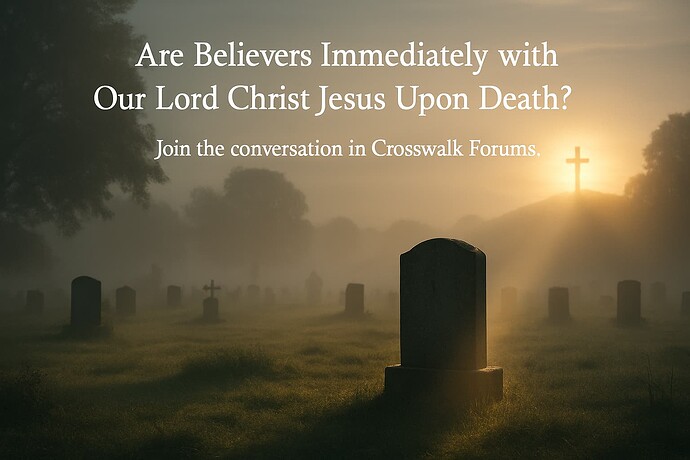Are believers immediately with our Lord Christ Jesus upon death?
As Christians reflect on what happens after death and how Scripture speaks of the body, Spirit, and resurrection, we invite your voice in Crosswalk Forums.
#LifeAfterDeath #BiblicalResurrection #christianforums #crosswalkforums #forums #crosswalk #faithcommunity #faithforums
2 Corinthians 5:6-8 is used by many to say when we die we immediately go to be with the Lord in heaven, but these verses do not mean that at all.
If you go back to verse one and two in chapter 5 the tabernacle being spoken of is our fleshly body and when we are in the flesh we are separated from God because flesh and Spirit can not mix, Romans 8:6, 7.
Sin separates us from God because God is a spirit and can only recognize his own children by what spirit is living in their hearts. We have to renew, rebirth – born again Gods Spirit within us in order to be called a child of God and see the kingdom of heaven, John 3:3-7. We now put off the old man (flesh) and put on the new man (Spirit), Colossians 3:1-17. We are renewed by the word of God and through the Holy Spirit teaching us of all things, John 14:26.
John 3:6 that which is born of the flesh is flesh and that which is born of the Spirit is Spirit. When we are in the flesh or at home in the body this is our natural carnal being. When we are in the Spirit allowing Gods Spirit to take over the flesh then we are in the presence of the Lord through the Holy Spirit that dwells in us.
God breathed life (breath/spirit) into us, Genesis 2:7, that made us a living soul and what goes back to God when this physical body dies (returns to the dust of the ground) is that very spirit of life God gave us, Ecclesiastics 12:7. Only those of faith under the old covenant (OT) and those of faith under the new covenant through Christ Jesus (NT) will God take that spirit back and reserve it until Christ returns. At that time we are raised with a new glorified body, 1Corintians 15:51-58; 1Thessalonians 4:13-18, and then we are given back that spirit of life to have everlasting life with the Father.
According to John 3:13 no one has ever ascended into heaven other than Christ.
Scripture says we sleep in the ground until the coming of the Lord. Those whose names are written in the Lambs Book of Life will be raised to everlasting life with God and those who names are not found will face Gods Great White Throne Judgment and will be cast into the lake of fire, John 5:28, 29; Revelations 20:11-15.
Are the Scripture references quoted above accurate?
Johann.
